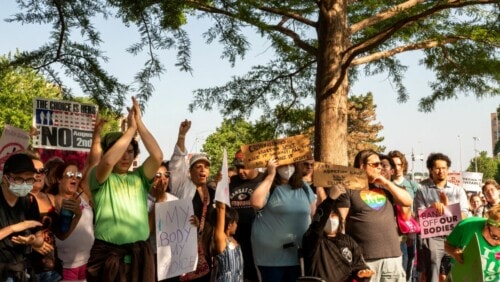New Push in Missouri to Provide Free Emergency Contraception Missouri Family Health Council will mail more than 5,500 free kits containing emergency contraception pills in a pilot program launching Thursday
Published June 1st, 2023 at 9:37 AM
Above image credit: Plan B emergency contraception packages. (Photo illustration by Justin Sullivan | Getty Images)Anyone with a Missouri address can now request emergency contraception pills be shipped to them by mail, for free, under a pilot program launched Thursday by a health care nonprofit.
Missouri Family Health Council Inc. launched the “Free EC” initiative using federal Title X funds for family planning programs. Missourians can request the pills through an online form on the nonprofit’s website or pick them up at designated in-person centers.
Also known as the morning-after pill, or by the brand name Plan B, the emergency contraception pill is an over-the-counter form of birth control that can be taken up to five days after unprotected sex to avoid pregnancy.
The goal of the initiative, Executive Director Michelle Trupiano said, is to reduce geographic and financial barriers Missourians face in accessing emergency contraception pills.
“Really since the Dobbs ruling last summer,” Trupiano said in an interview with The Independent, “we realized that it was more important to combat misinformation and stigma about and to improve access to emergency contraception.”
Since last summer, abortion has been outlawed in Missouri except in cases of medical emergency.
Emergency contraception pills have remained legal, but confusion and misinformation around that fact in Missouri and nationally have mounted.
A poll conducted by the health policy research nonprofit KFF this year found that one-third of American adults said they are “unsure” if emergency contraception is legal in their state, though it is legal in all 50 states. Confusion about its legality is more pronounced in states where abortion is banned, the poll found.
The emergency contraception pill works similarly to birth control pills, generally to prevent ovulation, but most adults incorrectly believe it can end early pregnancy, KFF found.
“We definitely hope that as more people become aware of this (initiative), that it will combat the misinformation that maybe emergency contraception is illegal,” Trupiano said.
“And so that more people will feel more confidence that they understand the difference between emergency contraception and medication abortion, and that they are able to talk about it and feel confident in terms of the legality of all methods of birth control.”
The nonprofit created more than 5,500 kits, Trupiano said, each of which includes two doses of the emergency contraception pill, along with safer sex supplies like condoms and family planning information.
“While we partly did this as a response to the Dobbs decision, we also know that it’s not a solution to the abortion access crisis,” Trupiano said. “It’s just one way to try to ensure that as many people have access to preventive care as possible.”
Missourians can request one of the kits by submitting a form on the nonprofit’s website, or going to one of the in-person distribution centers partnering with the nonprofit, which include health centers and private community partners such as domestic violence organizations.
Trupiano hopes that down the line, Missouri Family Health Council can “secure additional funding, continue this in a sustainable way,” she said, “because we know the need is great.”
The Missouri Family Health Council is the state’s sole grantee of federal family planning funding through Title X. The state has tried, in recent years, to oversee the funds themselves, raising advocates’ concerns the state would limit which providers could receive the federal planning dollars. But so far, that attempt to control the funds has been unsuccessful.
Clara Bates covers social services and poverty for the Missouri Independent, where this story first appeared.



